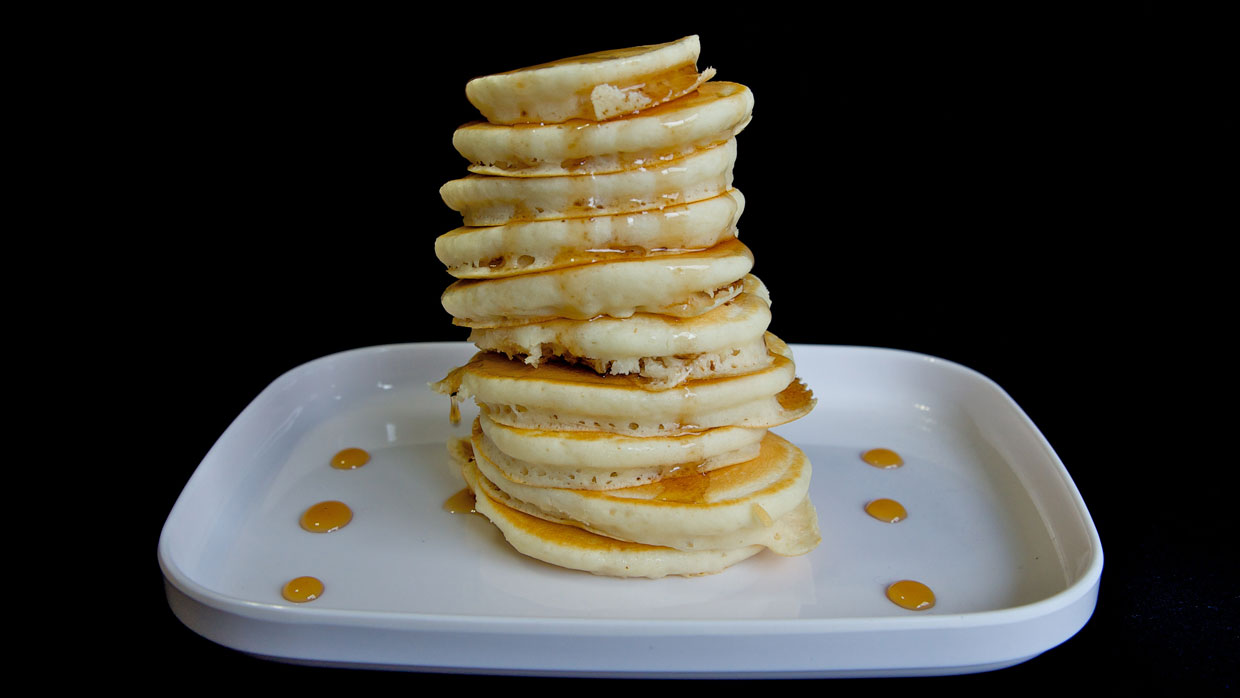Can eating pancakes enrich Christian piety? As a part of the traditional celebration of Shrove Tuesday, I believe flapjacks can build our faith.
Shrove Tuesday is essentially the British take on Mardi Gras or Carnival. But instead of flamboyant parties filled with riotous excess, the understated British gather calmly in their homes on the day before Lent to fill themselves with pancakes.
Why pancakes? In medieval Europe, Christians often gave up eating rich foods like meat, eggs, and milk for the 40-day period of penance, prayer, and preparation leading to Easter. The practice and duration of the ritual corresponded to Christ’s 40 days of fasting in the desert.
During Lent, perishable goods would spoil, so pancakes—traditionally just eggs and milk mixed with flour—were the ideal meal for consuming Lenten no-no foods.
But Shrove Tuesday wasn’t just about cleaning out the kitchen. It was also about cleaning out the heart. Shrove is the past tense of shrive, which means to confess sins and to have sins absolved.
Priests would ring shriving bells to call pancake-laden parishioners to church to confess their sins—perhaps starting with their gluttony!
During the Reformation, many Protestants, especially my English Puritan ancestors, dismissed Lent and Shrove Tuesday as superstitious Catholic observances aimed at earning God’s favor through human works. Thus, strict Lenten observance declined among English-speaking people.
But the palate proved mightier than the Puritans. Most Britons didn’t want to give up pancakes—even if, without an austere Lent, there wasn’t any real reason to use up all the eggs and milk. Eating pancakes was reason enough for a party. To this day, people all over Britain and in scattered Anglophone countries eat pancakes on Shrove Tuesday.
But with the underlying religious motivation largely gone, the occasion is now more commonly known as Pancake Tuesday. And what a pity. Without the “Shrove” in Shrove Tuesday, it’s just another Tuesday, but with more calories.
I now live in England, and the last two years I’ve been asked to give talks on the “real meaning of Shrove Tuesday” to students at Cambridge University. Holding Shrove Tuesday pancake feasts is as a low-key—though definitely not low-carb—opportunity to offer simple hospitality and share something of the Christian message with friends and neighbors. Call it flapjack evangelism, if you will.
Of course, I feel a bit silly as an American reminding native Brits of the meaning of their holiday. But, for me, the situation is similar to American Thanksgiving.
Reducing Shrove Tuesday to Pancake Tuesday is like calling Thanksgiving “Turkey Day.” Pancakes and turkey are delicious—though probably not together—but eating them loses spiritual and cultural meaning without the shriving and the thanksgiving.
Just as American Christians are fond of hearkening back to the original godly purpose of the “First Thanksgiving,” so too we can recover the Christian underpinnings of Shrove Tuesday—as part of the Lenten preparation for Easter.
Lent is to Easter what Advent is to Christmas. Lent gets us in the “Easter spirit,” and helps us appreciate that Easter is theologically more significant than Christmas—even if contemporary Western culture gets it backward.
Christians don’t worship a baby who stayed in a manger. We worship a Savior who died for us and rose again that we might, through him, have victory over sin and death. He is risen, so we can be shriven. The season of Lent focuses our hearts and minds on this wonderful truth.
And it all begins with pancakes. The quaint and seemingly anachronistic feast of Shrove Tuesday helps us transition from the everyday world to a time of preparation for the most important day in the Christian calendar—and the most important day in human history.
This article has been edited since its original publication.
Judd Birdsall is a PhD candidate at Cambridge and an editorial fellow with The Review on Faith & International Affairs in Washington, D.C.
Image credit: Rudy Eng, Flickr









